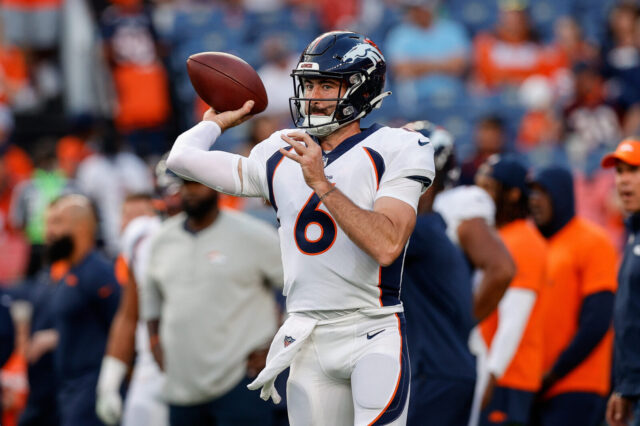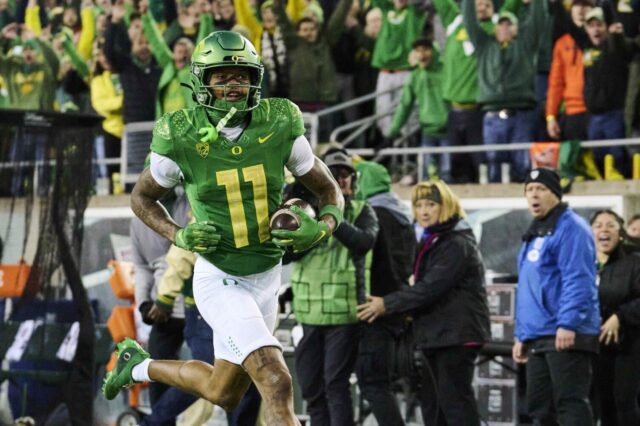Last week, Peyton Manning told the Broncos that he’s ready to go in 2015; he’s both physically and mentally prepared to play another season. Despite this information, the team didn’t announce that the future Hall of Fame quarterback would be returning for at least one more season. There were no celebratory trumpets played at Dove Valley; white smoke did not billow from Pat Bowlen’s chimney.
Which begs one question: Why?
Since the 2014 season ended, everyone within the organization has been saying that it was up to Manning if he was going to play again. The Broncos weren’t going to pressure him to make a decision, providing the quarterback with the time necessary to weigh his options.
Well, he’s made up his mind. So what’s the hold up?
As first suggested in this space on January 19, the Broncos don’t necessarily want Manning back. If they did, Friday would have been a day for orange-and-blue confetti to fly in the Mile High City.
Instead, the waiting game continues. Now, it appears as though Denver will welcome Manning back to the team, but only on their terms. They want the quarterback who has gone 38-10 during his tenure with the team to take a pay cut.
And around Denver, that news isn’t being met with shock. In fact, it’s being celebrated. Somewhat astonishingly, fans agree with the team; they think Manning is overpaid and should forfeit some of the $19 million he’s slated to earn in 2015.
This is a ludicrous notion. It’s also ill-informed and unfair.
Manning’s salary isn’t excessively high, at least in relative terms; in fact, it’s right in line with what other top-notch quarterbacks earn per year. There are 14 signal callers who cash checks totaling more than $15 million per season; Manning’s salary puts him right in the middle of that group. And he’s surrounded by plenty of guys – Matt Ryan at $21 million and Colin Kaepernick at $19 million, just to point out two – that aren’t nearly as accomplished.
So he should play for less than the going rate? That’s the argument?
Nobody else is doing that. When it’s time to get paid fair-market value, such as Russell Wilson’s impending contract that will make him the richest quarterback in NFL history, every big-name quarterback in the league takes the money. They don’t leave cash on the table.
But Manning should? That seems like a bit of an unfair request.
Some will argue that the quarterback should restructure for the good of the team, taking less money so the Broncos can add other pieces around him. That sounds like a noble gesture, one that is really easy to make with someone else’s millions, but it’s not very practical.
Almost always, a restructured contract comes in the form of less money per season but more money overall. For example, a player can nix his one-year, $10 million contract for three years at $6 million per season; they’re trading $10 million total for $18 million total, while providing 40 percent salary cap relieve in the first year. Given that Manning is most likely only playing one more season, however, that becomes difficult to do; there’s no way to stretch out the money and/or prorate it across a longer timeframe.
That type of accounting is about as boring as, well, accounting. So most people don’t want to pay any attention to it; they’d prefer to make blanket statements, professing what Manning should do despite having no knowledge of the logistics involved, and then criticize the guy if he doesn’t do it.
But that’s nothing new. Plenty of fans ripped Manning during the 2014 season for not doing what Tom Brady did with his contract, despite having no understanding whatsoever about how the Patriots quarterback restructured his contract.
In reality, Brady didn’t give up a single penny; in fact, his new deal will put an extra $4 million in his pocket. And that’s for changing one word – “skill” to “injury” – which allowed New England to avoid having to pony up all three remaining years of Brady’s contract in a deposit with the league. He helped the team’s cash flow, and got a nice little bonus for the gesture. Technically, the Pats can now cut the quarterback without being on the hook for his contract, which is a bit of a “risk” for Brady; Manning has a better chance of leading the league in rushing than that happening, however.
But again, it’s no fun to read the fine print and understand the contract. It’s way easier to simply cast stones at a guy for not doing something that he doesn’t even have the ability to do because his contract doesn’t include language about money being guaranteed.
In reality, the only way for Manning to provide the Broncos with salary cap relief – something he already did in 2013, to very little fanfare – is to take a pay cut. He has no option other than to simply forgo millions, so Denver’s brass can give them to other players.
While that would be a nice gesture, the fairness of such a request should be a part of the equation. As critical as people have been of Manning’s play in 2014, is he really deserving of a pay cut?
On the season, the quarterback finished with the fourth most passing yards (4,727) in the NFL, the second most touchdown passes (39) and the fourth highest QB rating (101.5). It’s a testament to how great of a player Manning has been that numbers like that are considered a “down” year.
Despite being a top-five quarterback, the Broncos want Manning to earn less than Jay Cutler ($18.1 million), Alex Smith ($17 million) and Andy Dalton ($16 million). Anyone being honest would admit that would be a tough pill to swallow.
It’d be especially difficult if Manning is the only star on the team asked to take a pay cut. In the spirit of fairness, everyone atop the Broncos payroll should have to make a sacrifice. Most of the 10 highest-paid players on the team didn’t have as good of a year as Manning did; shouldn’t they be asked to play for less too?
Ryan Clady, a guy who was torched in the Broncos playoff loss on the strip sack of Manning, is set to earn nearly $9 million in 2014. Is he really worth it? How about DeMarcus Ware, a player who disappeared during the second half of last season, and his $8.67 million? Maybe punter Britton Colquitt, who had a terrible season, would be willing to shank kicks for something less than $3 million in 2015?
Demaryius Thomas is going to get a huge payday, despite the fact that he essentially quit on his team during the Broncos playoff loss to the Colts; maybe he should play for less? And Julius Thomas is going to demand a hefty contract, even though he’s a tight end who can’t block and was never able to bounce back from a midseason ankle injury; does that seem right?
The list goes on and on.
If the idea is that a veteran player should give up some money – because they’ve already earned enough during their career, right? – so the rest of the roster can be bolstered, that logic should be applied to everyone. It’s not just Manning who should be asked to take one for the team.
Of course, that all is based on the notion that the Broncos need salary cap relief. There’s no evidence to support that claim. None. It’s just become conventional wisdom, something everyone repeats as though it was etched onto a stone tablet and brought down from Mount Evans.
Currently, the Broncos are roughly $20 million under the estimated 2015 salary cap. After they make some moves – such as parting ways with players like Andre Caldwell, Chris Clark and Manny Ramirez – they’ll have a few more million at their disposal. That provides them with quite a bit of flexibility.
Last season, Denver was able to maneuver around the cap during free agency, signing Ware, Aqib Talib, T.J. Ward and Emmanuel Sanders to big contracts. And they did it without asking Manning to take a pay cut. Why is 2015 suddenly different?
If the Broncos do in fact have salary cap issues, that’s not Manning’s fault. His contract isn’t an albatross that has caused Denver’s payroll to get out of whack, given that half the teams in the NFL find a way to pay their quarterback similar money.
The reality is that the Broncos cap issues – if they have any – are the result of John Elway’s poor decisions. He’s the one who gave an aging pass rusher a $30 million contract, trying to fill a hole on the roster that was created when he bungled the Elvis Dumervil situation. He’s the one who has botched drafts to the point that Denver doesn’t have enough young players filling key roles; instead of having relatively inexpensive contributors playing out their rookie deals, the Broncos are forced to sign high-priced veterans.
So it’s up to Manning to forgo millions so Elway can try to spend his way out of his mistakes once again? And the quarterback is a selfish, bad guy for not jumping at the chance to give back some dough?
To a large extent, it’s an outrageous request by the Broncos, asking a player who is 14 months removed from posting the greatest quarterback season in NFL history to take a pay cut. It’s even more ridiculous that fans are ready to chuck rocks at Manning if he isn’t willing to accept the bogus offer.
He’s supposed to play below market value? He’s supposed to take a pay cut when other high-priced players don’t? And he’s supposed to give back millions so Elway can patch the holes in the roster that he’s created?
That’s a ridiculous request. And Peyton Manning knows it.



